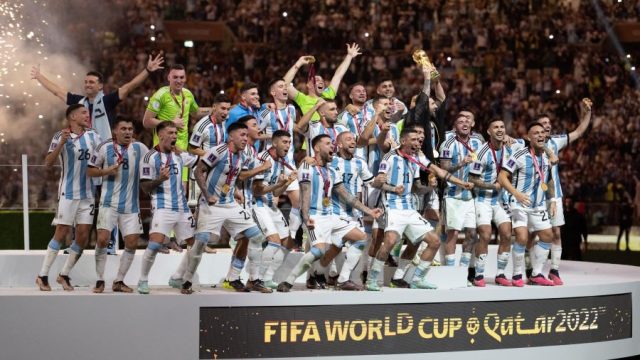...From 172 goals scored, to five billion people engaged, a host of new records were set
…Final achieved a global reach of close to 1.5 billion viewers, with the opening match capturing over 550 million
…Almost 6 billion engagements on social media, with 262 billion cumulative reach across all platforms
…One month since an unforgettable Final, we take a deep dive into the best ever FIFA World Cup and the sheer scale of organising the biggest single sporting event on the planet
WED. 18 JANUARY, 2023-theGBJournal| On 18 December 2022, 88,966 spectators packed into Lusail Stadium and close to 1.5 billion around the world watched a pulsating Final between Argentina and France.
One month to the day since Lionel Messi, Lionel Scaloni and La Albiceleste lifted the trophy, we review some facts and figures from on and off the pitch, that reflect the sheer scale of the biggest single sporting event on the planet.
Early figures suggest that around 5 billion people have engaged with the FIFA World Cup Qatar 2022, following tournament content across an array of platforms and devices across the media universe. On social media, according to Nielsen, there have been 93.6 million posts across all platforms, with a 262 billion cumulative reach and 5.95 billion engagements.
The FIFA World Cup Qatar 2022™ was enjoyed inside the stadiums by 3.4 million spectators – up from 3 million in 2018 – who were treated to a historic tournament. 172 goals ensured that Qatar 2022 became the highest scoring FIFA World Cup in history, eclipsing the previous highest total of 171, in both 1998 and 2014.
Three matches at Lusail Stadium, including the Final, saw the highest attendance for a match registered at a FIFA World Cup since USA 1994 when Brazil played Italy in front of 94,194 at the Rose Bowl in Pasadena.
It was a tournament too of notable contributions from some of football’s heavyweights. Cristiano Ronaldo became the first man to score at five FIFA World Cups (2006, 2010, 2014, 2018 and 2022) while Lionel Messi became the first player to score in four successive knockout stage matches in a FIFA World Cup since the round of 16 was introduced into the modern era, at Mexico ‘86.
Messi also passed another landmark when he made his 26th FIFA World Cup appearance in the final, overtaking the record previously held by Lothar Matthäus.
The fastest goal came after just 68 seconds when Canada’s Alphonso Davies, 22, scored against Croatia. At just 18 years and 110 days, Spain’s Gavi became the youngest goal scorer at a World Cup since Pelé in 1958, with a stunning strike during the 7-0 win against Costa Rica.
There were many other notable achievements:
Stéphanie Frappart became the first woman in FIFA World Cup history to referee a finals match. Together with assistants Neuza Back and Karen Diaz, she composed the first-ever female trio to officiate in the tournament.
The eight group stage winners included teams from four different confederations for only the third time, and the first in 20 years (1986, 2002, 2022).
Three teams from the AFC reached the round of 16 for the first time in FIFA World Cup history.
Qatar 2022 was the first time an African team made it to the semi-final, with Morocco’s incredible campaign uniting the Middle East and Arab world.
1.85 million visitors attended the FIFA Fan Festival in Doha which had its very own anthem for the first time – “Tukoh Taka” was one of the nine songs of the first-ever FIFA World Cup Official Soundtrack, which generated 450 million views on YouTube.
In a record breaking first, FIFA+ live-streamed the entire tournament in Brazil, partnering with the likes of YouTube streamer Casimiro and Brazilian legend Ronaldo to deliver an innovative and engaging product to a new generation of fans.
All global and regional sponsorship packages were sold out, with the 32 commercial affiliates activating more than 600 special marketing programmes.
No tournament can run without the incredible hard work behind the scenes. The FIFA World Cup Qatar 2022™ was supported by 20,000 volunteers, selected from 150 nationalities. 17,000 volunteers were residents of Qatar; 3,000 were international. The volunteers ranged in age from 18 to 77 years old. In total, there were 180,000 accredited people working to make the tournament a success, including more than 10,000 media representatives who shared their impressions and images with the world as football history was being made.
Qatar 2022 also featured a number of firsts in the areas of workers’ welfare and sustainability. This was the first FIFA World Cup to offer audio-descriptive commentary for blind and partially sighted fans globally through the internet, with the service being available in English and Arabic.
Three stadiums hosted sensory rooms for fans with sensory access requirements, while every match venue was built to exacting accessibility standards, including accessible parking, seating, bathrooms, and concession stands.
Twitter-@theGBJournal|Facebook-The Government and Business Journal|email:gbj@govbusinessjournal.ng|govandbusinessj@gmail.com










